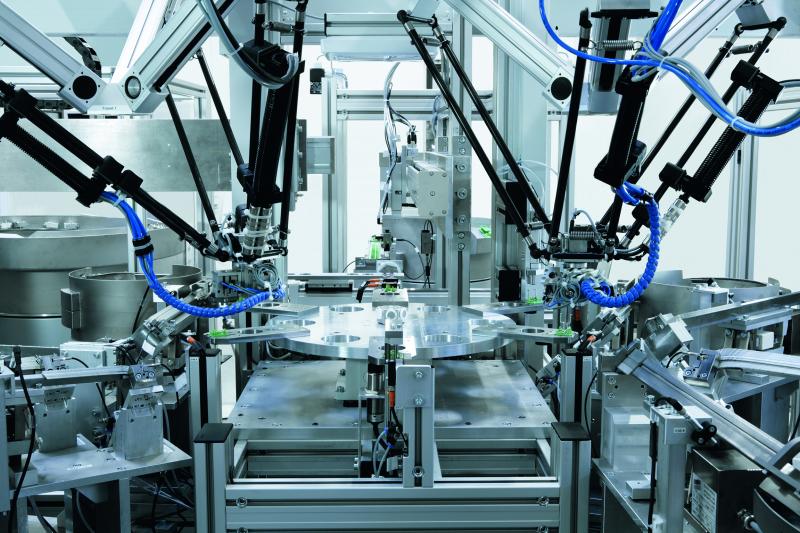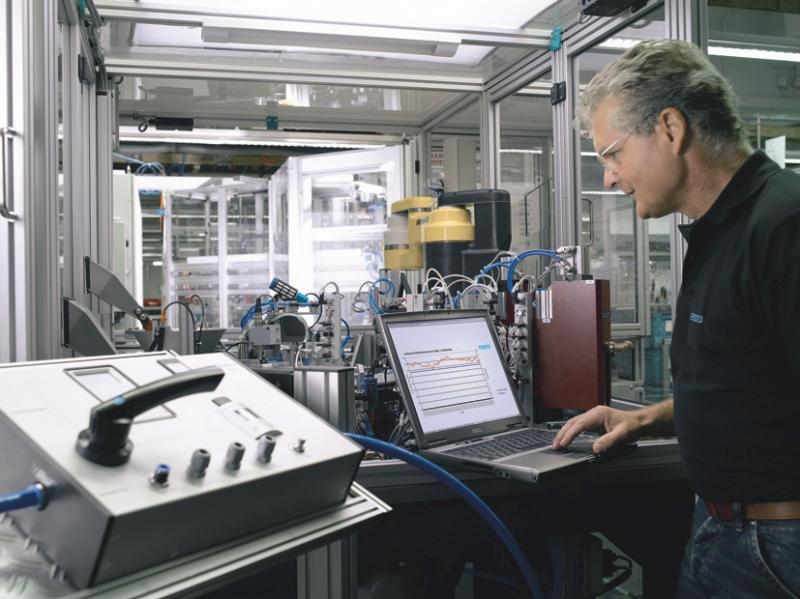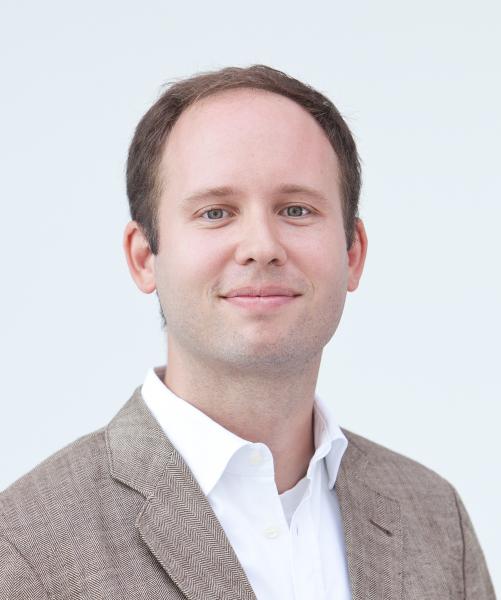Green Factory marries economic to ecological excellence
Frankfurt am Main, 28 January 2014. – The METAV in Düsseldorf from 11 to 15 March 2014 will be showing how leading manufacturers of production technology are nowadays bringing economic and ecological excellence into productive harmony. But what will things look like in the future? What can we expect to see at the METAV 2020? The formula for the green factory of tomorrow is called EMC² Factory: in the EU’s research project, European firms and researchers are developing concepts for factories designed to improve particularly energy-intensive production operations in the automotive, aviation and railway industries. From the viewpoint of the automation specialists Festo, Dr. Nico Pastewski, Innovation and Technology Manager of the Esslingen-based company, was interviewed about the initial ideas involved and the role of machine tools in this context.
Dr. Pastewski, why is your company taking part in the EMC2 Factory project, and what are you expecting from it?
Dr. Pastewski: As an automation specialist, our paramount goal is to upgrade production efficiency, both for the benefit of our customers and in our own production operations. Energy-efficiency and resource-economy form part of the company’s mission statement. We are confident that the future competitiveness of Europe’s industrial base requires a rigorous focus on sustainability, and we in Europe also have a pioneering role to play. In the EMC2 Factory research project, we have since the autumn of 2011 been working on solutions for the Green Factory, together with 16 partners. Festo is taking part because the requirements for the sustainable production operations of the future necessitate the coordinated involvement of all the parties concerned and here yardsticks, standards and tools are being developed for the future. In a research project of this kind, project partners from the research community and the industrial sector are brought together. The holistic conceptual focus and the shared formulation of a new approach are very valuable for everyone involved.
What is your company contributing?
Dr. Pastewski: Festo is actively involved in eight of the ten work packages. In the work package entitled “Production control system re-engineering with focus on energy efficiency”, we are acting as the coordinator. We are contributing our expertise in the field of factory and process automation, with technology-independent competence in pneumatic and electrical drive technology, and with our can-do in-house research capabilities. In the WP4 work package, participants are tasked with formulating specific solutions for energy-efficiency-oriented optimisation of production control systems. Here, as a project team, we are examining all levels of the production operation, from the higher-order Manufacturing Execution System (MES) and the actual production lines right down to the component level. The individual solutions are being developed both for planning a new factory (“greenfield”) and for optimising an existing factory in operation (“brownfield”).
Festo is primarily contributing approaches on the component level: these include decision-supporting software tools for selecting the appropriate drive technologies, and efficiency-boosting pneumatic and electrical drive control systems. Plus monitoring solutions for machines that will interrupt the supply of compressed air if it’s not needed, so as to save significant amounts of compressed air and thus energy – rather like the stop-start mode in modern-day cars.
How does the customer benefit from this?
Dr. Pastewski: With the holistic approach we already have in place, we help our customers to save energy: as a solution provider in the field of automation technology, we focus particularly on how the energy can be utilised efficiently in the customer’s machines. We advise customers on the optimum energetic design of their machines, on a cross-technology basis using a holistically conceived, four-part approach: how can the machine or the automation solution be intelligently and energy-efficiently designed? What energy-saving products and solutions are there? How can existing machines be optimised with the aid of the “Festo Energy Saving Service”? How can energy be saved by means of consultancy, staff training and fundamental planning of the production processes?
What role in your view will machine tools play in the green factory of the future, and what can your company contribute here?
Dr. Pastewski: Factories’ consumption of energy and resources is determined by a large number of individual consumers. Machine tools account for a significant proportion of the outlay in manufacturing a product – i.e. in a very early phase of the industrial value creation process. For machine tools, the same applies as for other systems too: the application concerned decides on the energy-efficiency of a line and whether the best solutional concept is based on pneumatic or electric drives, or both of them combined. Users will tap into the biggest energy-saving potential when they select the optimum technology and the correctly dimensioned drive components.
In addition, the drive solutions themselves are being continually improved, so that in future they will require less and less energy. Application-responsive control system concepts or also the intelligent interaction of components will in future help even more effectively to reduce losses like leakage or braking energy. Moreover, monitoring and diagnostic functions will be better able to fine-tune the drive systems, so as ultimately to achieve more savings.
Some science fiction, please: what could the EMC2 Factory look like?
Dr. Pastewski: The project vision is that by the year 2020 the factories in Europe will be able to reduce their consumption of energy and resources, and their emissions, by more than 30 per cent per unit produced, compared to the level of 1990. At the moment we are developing numerous stand-alone solutions and approaches for energy-efficient production operations. The next step is the same key as for the production operations of the future in general. The task here is to progressively integrate the stand-alone solutions into complete-system packages, using information and communication technologies: the keywords in this context are transparency, availability of consumption data in real-time, and decentralised intelligence. The complexity is here required to be kept maximally in the background, so that at the same time the systems remain intuitively comprehensible and easy to manage for the operator.
In bionics, too, and our Future Concepts, Festo is addressing the production worlds of the future. Bionic models demonstrate solutional approaches for important issues like function integration, miniaturisation, flexible and adaptive systems, or intuitive operator control of machinery.
Dr. Pastewski, thank you for talking to us.
The interview was conducted by Nikolaus Fecht, specialist journalist from Gelsenkirchen.
Personal details
Dr. Nico Pastewski studied technical environmental protection at Berlin University of Applied Science, and then worked on the academic staff of Seoul National University and at the European Commission on implementing eco-innovations. From 2006 to 2010, he worked as a project coordinator in the field of resource-efficiency at the Innovation and Technology Management Department of the Stuttgart-based Fraunhofer Institute of Labour Economics and Organisation (IAO), and was awarded his doctorate at Stuttgart University. Since 2011, Nico Pastewski has been the Innovation Manager at Festo AG & Co. KG, Esslingen, Germany, with a remit themed around energy-efficiency.
EMC²-Factory
Nine English words describe a very ambitious European research programme: it’s called “eco-manufactured transportation means from a clean and competitive factory”, or the EMC² Factory for short. 17 partners from nine different European countries (project participants include: Cecimo, Comau, Festo, Fiat, Siemens, plus the universities of applied science in Darmstadt and Brunswick) are in this EU project developing concepts for factories that are both economically and ecologically viable. The primary focus here is on improving energy-intensive production processes in the automotive, railway and aviation industries.
For further information: www.emc2-factory.eu
Background
Blue Competence – Engineering a better world
Sustainability in industrial production operations is a big issue at the METAV 2014 in Dusseldorf. Under the label Blue Competence 27 companies and two industry associations will be showing users from the industrial sector how they can raise potential here. The companies involved are: Arku, Cecimo, (Belgium), Cometel (Spain), Desch, DMG Mori, Gmtk,(Spain), Heller, Hermle, Hydac, Ibarmia (Spain), IK4-Ideko (Spain), Index, Juaristi (Spain), Kapp, KMT (Sweden), Nicolás Correa (Spain), Profiroll, Schneeberger, Schütte, Schwäbische Werkzeugmaschinen, Shuton (Spain), Siemens, Soraluce (Spain), Stama, Starrag-Heckert, Traub, Unionchemnitz, VDW, Waldrich Coburg.
The firms will be spotlighting a broad spectrum of solutions for an energy-autonomous, emission-neutral, ergonomical production technology. Well-illustrated samples of Best Practices as well as exhibits will be on display, rounded off by life-demonstrations of implemented measures.
In 2011, the VDMA (German Engineering Federation) launched the sustainability initiative of the machinery manufacturing sector, called “Blue Competence - Engineering a Better World”. So far, 38 organisations and more than 370 partner companies are participating, creating a platform for networking sustainable production and technologies. Each partner company evidences its sustainability contribution by relevant facts and individual success stories.
METAV 2014 in Düsseldorf
The next METAV will be held in Düsseldorf from 11 to 15 March 2014. In the even-numbered years, it is now firmly established as an important technology window showcasing the entire spectrum of production technology for manufacturers and customers from all over Europe. The METAV showcases the entire spectrum of production technology, focusing primarily on machine tools, manufacturing systems, high-precision tools, automated materials flows, computer technology, industrial electronics, and accessories. The target group for the METAV’s visitors includes all branches of industry that machine metal, particularly machinery and plant manufacturers, the automotive industry and its component suppliers, the aerospace sector, the electrical engineering industry, energy and medical technology, plus metalworking and the craft sector. At the last METAV in 2012, around 700 exhibitors from 26 different countries showcased their products, their manufacturing solutions and their service capabilities. They attracted around 40,700 experts from more than 30 different nations.
New at METAV 2014: in conjunction with Messe Erfurt, the METAV’s organiser VDW will for the first time be addressing the issue of additive manufacturing in medical technology under the aegis of the Metal meets Medical special show.
Your contact persons
German Machine Tool Builders‘ Association (VDW)
Sylke Becker
Director Press and Public Relations
Corneliusstraße 4
60325 Frankfurt
GERMANY
Tel. +49 69 756081-33
[email protected]
www.vdw.de
Festo AG & Co. KG
Karin Fischer
Corporate Communication - Technology, CC-T
Ruiter Strasse 82
73734 Esslingen
GERMANY
Tel. +49 711 347-57131
[email protected]
You will find texts and pictures on the internet under www.metav.com in Press Service. You can also visit METAV through our social media channels:









 Germany
Germany 